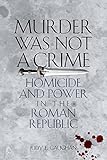Murder Was Not a Crime : Homicide and Power in the Roman Republic / Judy E. Gaughan.
Material type: TextSeries: Ashley and Peter Larkin Series in Greek and Roman CulturePublisher: Austin : University of Texas Press, [2021]Copyright date: ©2009Description: 1 online resource (214 p.)Content type:
TextSeries: Ashley and Peter Larkin Series in Greek and Roman CulturePublisher: Austin : University of Texas Press, [2021]Copyright date: ©2009Description: 1 online resource (214 p.)Content type: - 9780292795136
- 034
- KJA3397 ǂb G38 2010eb
- online - DeGruyter
| Item type | Current library | Call number | URL | Status | Notes | Barcode | |
|---|---|---|---|---|---|---|---|
 eBook
eBook
|
Biblioteca "Angelicum" Pont. Univ. S.Tommaso d'Aquino Nuvola online | online - DeGruyter (Browse shelf(Opens below)) | Online access | Not for loan (Accesso limitato) | Accesso per gli utenti autorizzati / Access for authorized users | (dgr)9780292795136 |
Frontmatter -- Contents -- Abbreviations -- Preface -- Acknowledgments -- Introduction -- 1. Killing And The King -- 2. Power Of Life And Death: Pater And Res Publica -- 3. Killing And The Law, 509–450 B.C.E. -- 4. Murder Was Not A Crime, 449–81 B.C.E. -- 5. Capital Jurisdiction, 449–81 B.C.E. -- 6. License To Kill -- 7. Centralization Of Power And Sullan Ambiguity -- Epilogue -- Notes -- Bibliography -- Index
restricted access online access with authorization star
http://purl.org/coar/access_right/c_16ec
Embarking on a unique study of Roman criminal law, Judy Gaughan has developed a novel understanding of the nature of social and political power dynamics in republican government. Revealing the significant relationship between political power and attitudes toward homicide in the Roman republic, Murder Was Not a Crime describes a legal system through which families (rather than the government) were given the power to mete out punishment for murder. With implications that could modify the most fundamental beliefs about the Roman republic, Gaughan's research maintains that Roman criminal law did not contain a specific enactment against murder, although it had done so prior to the overthrow of the monarchy. While kings felt an imperative to hold monopoly over the power to kill, Gaughan argues, the republic phase ushered in a form of decentralized government that did not see itself as vulnerable to challenge by an act of murder. And the power possessed by individual families ensured that the government would not attain the responsibility for punishing homicidal violence. Drawing on surviving Roman laws and literary sources, Murder Was Not a Crime also explores the dictator Sulla's "murder law," arguing that it lacked any government concept of murder and was instead simply a collection of earlier statutes repressing poisoning, arson, and the carrying of weapons. Reinterpreting a spectrum of scenarios, Gaughan makes new distinctions between the paternal head of household and his power over life and death, versus the power of consuls and praetors to command and kill.
Mode of access: Internet via World Wide Web.
In English.
Description based on online resource; title from PDF title page (publisher's Web site, viewed 26. Apr 2022)


